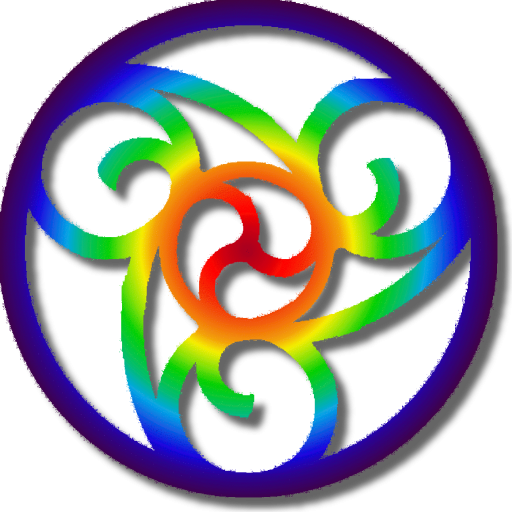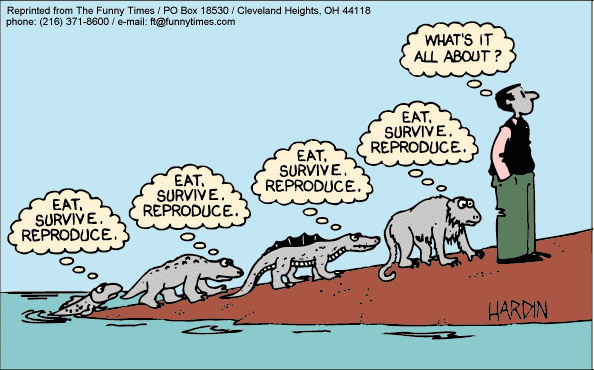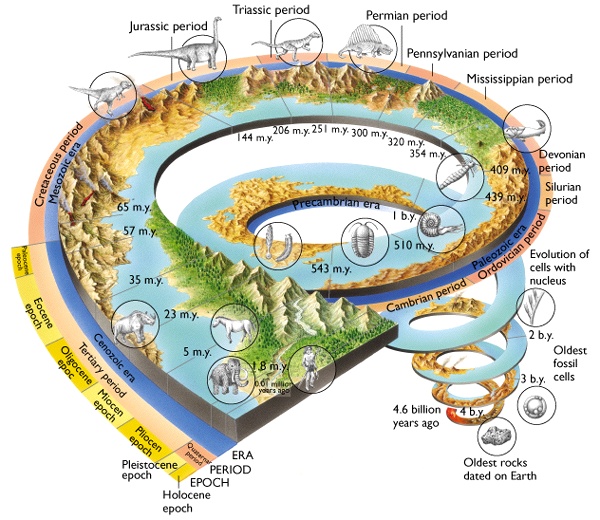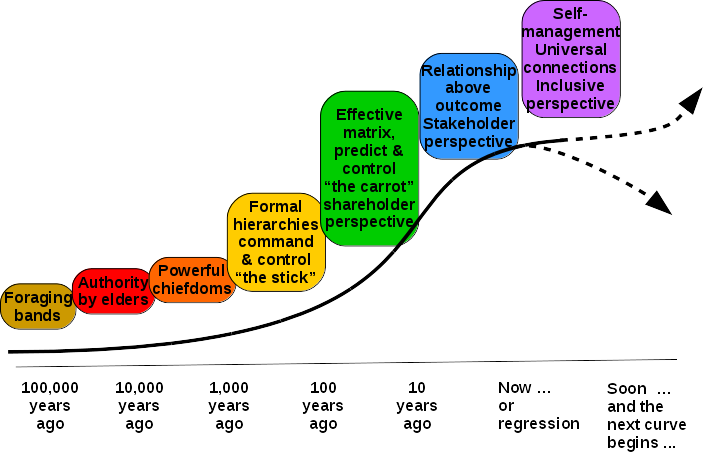
An essay on “education as if people and planet matter” originally drafted for The Dartington Trust and Resurgence and published on Clive Menzies Outersite.org.
Which came first, the chicken or the egg? The answer is obvious, if you can look back in time. Eggs came first in fish, reptiles, then birds. It was an egg that produced the first chicken, not a chicken that produced the first egg.
That is a big picture perspective, yet one that is obscure for most people around the world. Unexpectedly that perspective comes from inside ones own head, not from outside. Meta-cognition happens when we have experienced enough that our minds, our consciousnesses, emerge from that primitive, dark place of fear and desire to realise our holonic interconnectedness with all.
Understanding existence needs a big picture perspective because ideas are big. For example, “once upon a time our world didn’t exist. And then it did.” and “Once upon a time we didn’t exist. And then we did.”
That development of perspective, of greater awareness, should be core to education. It is not even part of it. More people realise that there are alternatives to the classic experiences of bullying, boarding and brainwashing to which we are all subjected. Pink Floyd was right: “We don’t need no education.” At least not the kind of prescriptive narrowing of minds that emerged with the industrial revolution to produce workers for machines, servants for the wealthy and soldiers for the powerful. That process of restricting thinking was established thousands of years ago when human communities started to encroach upon one another and hierarchies of control emerged as a survival tactic. This mentality persists in a world of abundance. The dampening imagination by a hegemony of “common sense” rules is proving to be deadly as the priorities of control, protection, competition and selfishness are applied through ever growing tools of economics and industry for the benefit of few and the consumption of the planet. We are eating ourselves (and the biosphere) to death. We can move on by simply recognising ourselves, letting go of fear and embracing our altruistic nature.
Learning is about making sense of ourselves and our world, which has always been intimately reflective of the nature of our world and universal laws (physics etc). This idea of “making sense” or becoming aware or consciousness is a phenomenon that has emerged along with evolution and accelerated with homo sapiens which has distinctive capacities, in particular the capacity for imagination. Imagination has given humans the opportunity to find enlightenment while also presenting the opposite danger of destroying ourselves. The extent of this capacity for imagination is so extreme that we can imagine ourselves. That is meta-cognition. We can see ourselves in our mind’s eye. This capacity allows us to imagine things that do not exist. Wonderful!! Yet this also presents the opportunity for lying. In fact lying is one of humanity’s successful survival tactics. Physical or verbal camouflage allows people to pretend to be very different form what they are. And this capacity for deception is used extensively, leveraged by modern technology, to manipulate for selfish gain. Manufacturing consent1 has become the principal activity of our consuming social model. But our capacities for imagination must be put to better use. If we do not choose to change the priorities we apply to our life choices from fear and desire to love and sharing, we will not emerge from adolescent consciousness2.
Reimagining education is the only way humanity can resolve its precipitous rush to decadence and disintegration. Looking at nature shows how we learn. We do not learn from books. Learning is about building personal knowledge internally (e.g. language). We learn from one another (copying), we learn from peers, we learn by showing others how to do things, we learn by solving problems, by invention and by failure. And if we have a learning map or guide we build knowledge more quickly, provided we remember to think critically about what we are looking at. As Socrates said:
“Believe nothing, no matter where you read it, or who said it, no matter if I have said it, unless it agrees with your own reason and your own common sense.”
This contrasts with the prevailing orthodoxy which is “listen and do as you are told”. Unfortunately, although the Age of Reason, two and a half thousand years go when scientific practices of critical reasoning emerged, explored “how to live” and recommended that we live “morally in accordance with the laws of nature”, it had to compete with basic survival fears as tribes were encroaching on one another and, in fear, competed for resources instead of collaborating.
This competitive mindset is a natural response to a limiting of food and shelter and emerged as a powerful tool to bring a group together under one banner to defend or grow their territory. Pantheistic roots, in which cause and effect were open to interpretation according to which gods and goddesses might be involved, were obliterated by monotheistic cults in which rules, made by a man, were to be obeyed. Monotheism pronounced that “you may have no other god than me, for I am a jealous god”. Even this core commandment ironically acknowledges that there are other gods and that this one is not enlightened but rather jealous. But this strategy concentrated power at the top of a male dominated hierarchy which was a powerful social construct used to control resources.
This rule based mindset persists today as a belief system which has not been critically examined. We have all bought in to an unnatural patriarchy which debases and denigrates the very nurturers of life, women. Modern culture continues to display signs of belligerence, control and male chauvinism rather than the behaviours associated with advanced culture, namely cooperation, freedom and sympathy with nature.
So, how to change pedagogy and curriculum? Soon and quickly are essential as the continuing implosion of the biosphere is passing tipping points and thereby jeopardising the retention of knowledge. Pedagogy, the culture of learning, should reflect the natural process. Look to Peter Gray and others who have shown how experiential, self-directed, peer learning in a community of inquiry nurtures healthy, happy people who can cope with change. Everyone becomes a teacher as we learn from practitioners, specialists, parents, coaches and friends. Curriculum, the ideas we explore, should help us make sense of ourselves and our world and quickly follow the path of emergent consciousness. As we progress, curriculum should reflect the physiological and psychological stage of individual development. Infants need nurture, care and touch to feel safe and secure so that they can explore the world around without worrying about food, shelter or companionship. Young children need play and friends and to explore their capacities of language, movement, emotions and cooperation. As interest and capacities develop, the opportunity to acquire technical knowledge, facts, should be nurtured, e.g. reading writing and maths, and then on to a range of topics explored, with supports, in that community of inquiry.
The idea of nature should be part of the mindset of learning. What does nature teach us? How do we fit in to the holonic system? This nature based learning will lead to the most neglected yet critical aspect of the emergence of consciousness, morality. Truth is fundamental to the way the universe works and truthfulness is the foundation of morality, which is the foundation of altruism in conscious entities. If we do not individually face reality and choose to adopt more sophisticated values than the survival modes of fear and greed, we will forgo the opportunity to thrive as consciousness allows.
Signs that society is becoming moral and altruistic will be a reduction in celebrity focus and wealth inequality as people learn to let go of their ego, recognise themselves, know themselves, develop self-discipline and become willing participants in the cosmic rhythm. Instead of being stuck in an adolescent hoarding of ego, where we need brands, titles and control over others to feel who we are, people will let go and thrive with the joys and productivity of interdependence with other people, nature and the universe3. We can enjoy cooperative interdependence while exploring the boundaries of consciousness and the meta-physical world that we know is there, but deny because we remain beaten down to survival behaviours by the gods of religion, money, politics, and technology, who have enslaved our minds. Education should help us break free and progress on the path of emergent consciousness.
1Manufacturing Consent, by Edward S. Herman and Noam Chomsky, reveals our powerful and corrupt commercial and political systems.
2Carl Sagan discussed the concept of technological adolescence, noting that civilisations appear unable to emerge from technological adolescence because they repeatedly extinguish themselves with their own power, through growing beyond its resources or habitat, or through hubris. Adolescent naivety is reflected in many aspects of human society including social dynamics, economic behaviour, even the political nature of technology development, so we can say humanity’s behaviour or consciousness is adolescent. Can we grow up?
3 Without our star, the sun, we are nothing.






Comments